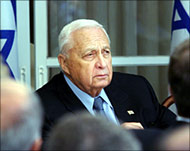Israeli peaceniks face uphill battle
When Yossi Beilin, one of the main architects of the collapsed Oslo Accords, wanted to give a lecture on the Geneva Accords at a public school in the southern Israeli town of Arad earlier this week, the principal asked him to leave the premises.

Beilin, a former minister of justice, was reportedly told that neither the students nor the teachers wanted to listen to him.
Adding insult to injury, Israel’s education minister, Limor Livnat, blessed the principal’s behaviour, saying he did the right thing.
The right-wing minister further accused Beilin of seeking to “poison young people’s minds” and of being “responsible for one of the darkest periods in Israel’s history”.
This episode in fact epitomises the unenviable state of affairs haunting the Israeli peace movement.
Jingoism
Indeed, four years of a jingoistic government and extreme right-wing mobilisation, coupled with the Palestinian Intifada, seem to have convinced most Israelis that peaceniks are either “traitors to Zionism” or “day-dreamers” who, in either case, should be ignored.
 |
|
Palestinians demonstrate on the |
According to Israeli-Arab Knesset member Ahmad Tibi, who has been closely working with Israeli peace groups for many years, the Israeli peace movement is now suffering from increasing estrangement within Israeli society.
“Sharon (and Barak before him) told Jews in this country that Israel had no partner on the Palestinian side and that the Palestinians were targeting Israel’s very existence, and they believed him.”
Tibi recognises that Palestinian attacks, especially those targeting Israeli civilians, have pushed the originally rightist Israeli populace further to the right.
However, he says that Israeli society had been drifting “menacingly to the right” long before the outbreak of the Intifada and the appearance of the “suicide bombing phenomenon”.
Far right
The drift to the extreme right has made it virtually impossible for the Israeli peace camp to transform society from its current “jingoistic mindset to the peace mode”.
Mary Schweitzer, an active peacenik, admits during an interview with Aljazeera.net that the Israeli peace movement is facing an uphill task trying to bring the Israeli public “to face the reality of the occupation”.
“I think our task and the task of all peace activists should be to bring ordinary Israelis to see for themselves the absolutely untenable oppressive lifestyle we have wreaked on the Palestinians.”
Non-violent approach
Schweitzer believes the central task of Israeli peace groups should be to “strengthen the Palestinian struggle for freedom through non-violence and cooperation with peace-minded Israelis”.
 |
|
Prime Minister Ariel Sharon is |
But in order to do that “effectively and successfully”, the Palestinians, she says, would have to adopt non-violence and passive resistance as their chief means of resistance.
“I know this won’t be easy for a people who are constantly tormented by a sinister military occupation. None the less, Palestinians must consider their long-range strategic benefits and not be held hostage to Sharon’s provocative tactics.”
Schweitzer, however, represents a tiny minority, not only in Israel but even within the Israeli peace movement and her strong views and outspoken criticisms against the oppression meted out to the Palestinians are not well-received in a society that is almost inherently inured to hate the Arabs.
Peace draft
A few months ago, and after more than three years of hibernation, the Israeli peace movement received a belated life-saver.
The Geneva Accords, the unofficial peace draft reached last year by former Israeli and Palestinian officials and negotiators, gave the Israeli peace camp “something to face the Israeli public with,” using the words of one Israeli peace activist.
However, as Uri Avnery, head of Gush Shalom (Peace Bloc) contends, the Geneva draft was “incredibly successful abroad but utterly failed to take roots in Israel”.
Avnery, who had initiated contacts with PLO leaders in the late 1970s, stresses that the Israeli peace camp is not a constant but a variable in terms of its strength, ability and popularity.
“What we can do depends to a large extent on the mood of both peoples.”
Alternatives
For peace movements to succeed, Avnery believes that both peoples must show “tiredness of the conflict” and realise that there is no alternative to peace.
He says that the Intifada, especially the “suicide bombings”, has hardened the Israeli mood and weakened the Israeli peace movement.
However, like Tibi, he says the problem did not start in September 2000.
|
“The trouble began with the catastrophic works of former Israeli Prime Minister Ehud Barak who told the Israeli public that he gave the Palestinians all they had asked for but that they opted for violence” Uri Avnery, leader Gush Shalom |
“I think trouble began with the catastrophic works of [former Israeli Prime Minister Ehud] Barak who told the Israeli public that he gave the Palestinians all they had asked for but that they opted for violence.”
He called Barak “more Sharon than Sharon” who sought to portray himself as a “peace-maker” while in reality he had all the hallmarks of Sharon.
Avnery cautions the Palestinian public as well as peace-minded Israelis not to believe a single word uttered by Sharon.
“You should never believe a word he says,” says Avnery. “He has never uttered a word of truth except by mistake. His aims have not changed, only his tactics have. Don’t look at what he says, look at what he does.”